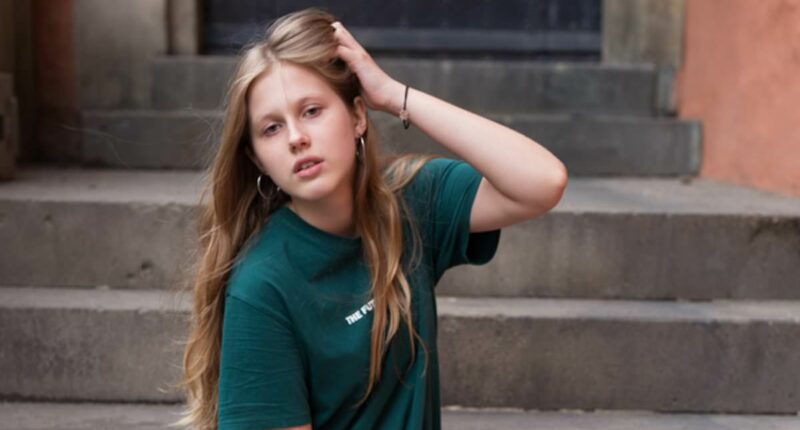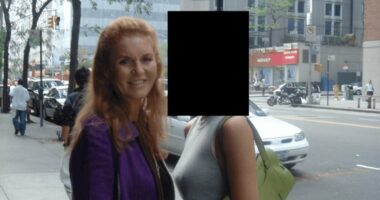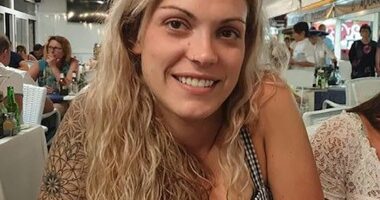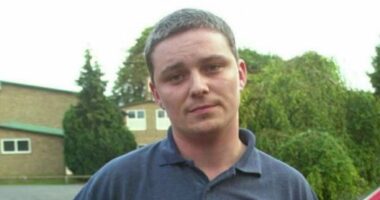Share this @internewscast.com
The barrage of emotions was overwhelming, and the psychological impact was staggering.
Despite being two years apart in age, Julia Wandelt clung stubbornly to her belief that she was Madeleine McCann, the little girl who vanished at age three during a family vacation in Praia da Luz, Portugal, in 2007. Her conviction held firm even against her Polish family’s objections and the undeniable truth revealed by a DNA test.
Once Wandelt embraced this belief, nothing could deter her, as detailed in the recent proceedings at Leicester Crown Court over the past month.
She persistently sent a flood of phone calls, emails, and messages not only to Maddie’s parents, Kate and Gerry McCann but also to their 20-year-old twins, Amelie and Sean.
In one day alone last April, Wandelt, a 24-year-old from Gorzów Wielkopolski, bombarded Kate with over 60 communications.
One message stated, “I know my accent is Polish because I live here, I know I look different and I’m not as pretty as Madeleine was, but I know what I know. I know what I remember.” She also penned a letter starting with “Dear Mum (Kate).”
Each message must have felt like a painful twist of the knife to the McCanns who, as Gerry admitted in his own evidence, still nurture a ‘glimmer’ of hope that their little girl might be alive.
Wandelt even turned up in the McCanns’ home village of Rothley, Leicestershire. Twice.

Julia Wandelt (pictured) delivered a barrage of calls, emails and messages not just to Maddie’s parents Kate and Gerry McCann, but also to their 20-year-old twins, Amelie and Sean

A younger Julia Wandelt with her half-brother and half-sister at her first communion
The second time she had co-accused, Karen Spragg, a 61-year-old Welsh grandmother, in tow. Spragg has been found not guilty of any offence – but audio recordings and messages document that she was a part of this whole upsetting saga.
‘Don’t you want to find your daughter?’ demanded Spragg – who was made subject of a five-year restraining order, preventing her from contacting the McCanns – as they accosted a terrified Kate.
The answer to that question is – painfully – obvious and it certainly doesn’t involve Wandelt.
Someone who undoubtedly knows the truth about Wandelt’s origins is her father Jacek, a 60-year-old radiologist who works in the same hospital where his daughter was born.
Speaking exclusively to the Daily Mail, it is clear he has struggled to come to terms with his daughter’s actions.
Weeping as he recalled the last time he saw her, just before Christmas, Jacek said: ‘When I saw her it had been a while since she said she was Madeleine McCann and so I thought maybe the situation was getting better, but I was wrong.
‘We had gone for a drive and then, just as she did when this all started a few years ago, she said to me, ‘Daddy, I love you, but you are not my dad, I am Madeleine McCann’.
‘I said, ‘I am your father; you are not Madeleine,’ but she wouldn’t listen to me, no matter how much I tried to reason with her.’
What on earth brought this bright, middle-class young woman – who, according to her barrister was depressed but not mentally ill – into the orbit of the McCanns?
While Wandelt has never explained her motives, having spoken to her father and a former childhood friend, the Daily Mail has pieced together the story of a young woman who had a conventional, loving childhood until it was derailed when she was abused by a family member.
It is this event that appears to have marked a fundamental change in Wandelt, turning her from an ambitious child who hoped to follow her father into the medical profession into a teenager who craved fame and the affirmation of strangers.

Madeleine McCann was three when she went missing on a family holiday to the Portuguese resort of Praia da Luz in 2007
Even before she courted online attention with her claims to be Maddie, she made attempts to become a model, photographer, singer, and even appears to have dabbled in X-rated material; traces of which remain online.
For the avoidance of doubt, the Daily Mail has seen a copy of Julia’s birth certificate which gives her date of birth as August 2001 – two years before Madeleine was born – and lists her parents as Jacek and his then partner, Dorota.
While Wandelt’s parents were never married, and split when she was young, the youngster had a comfortable upbringing with her mother, a businesswoman, and stepfather Piotr, who works in finance. The couple moved to a wealthy suburb of Wroclaw, the third-largest city in Poland, when Wandelt was aged around seven.
They have avoided public attention, selling their home and Dorota’s clothing business in the wake of their daughter’s arrest.
But Julia’s heartbroken father, who lives with his current partner and their two children – a son aged 12, and a daughter, nine – is haunted by memories of happier times. As he recounted the events that shaped his daughter’s life, he often pleaded, ‘Why?’
While Jacek says geographical distance inevitably meant he was not as present in Julia’s childhood as he would have liked, he points to photographs of his daughter growing up – on family holidays, at parties with her paternal grandmother, at her first Holy Communion.
‘Look at these pictures,’ he said. ‘This is before all this madness started, you can see she is a happy, normal girl but now…’
For Jacek, the events so vividly described in court all began with his daughter being abused by her maternal step-grandfather Peter Ney. Leicester Crown Court was told about the abuse, and official records in Poland, seen by the Daily Mail, document that Ney was convicted in 2012, and sentenced to two years in prison. He was 74, his victim was just 11 – and only nine at the time the abuse began.
‘That man is a monster,’ says Jacek, despair etched on his face. ‘Up until then, Julia was happy, she was carefree. Then this man – I say man, he is a monster – molested her and after that she changed completely.
‘She became withdrawn and wouldn’t talk very much. She just closed up, put up a wall and it was heartbreaking to see.’
The Daily Mail has also seen one of Wandelt’s school reports, from her time at Wroclaw’s Polish-German Elementary School, where she loved computer science and languages and was elected class president.
It charts the same path.
‘Julia is an ambitious and hard-working person,’ notes her report from 2011, when she was ten.
It also adds she was ‘cheerful, sociable, cultured, with wide interests’ and ‘interacts effortlessly with other children and maintains good relationships with them’.
But it goes on to note she is undergoing psychiatric care.
‘A noticeable change in the child’s behaviour has been evident since January 2011,’ the teacher writes. ‘The girl is sad. She reacts by crying to situations that do not go her way…’
One line is striking: ‘She shows a strong need to be the centre of attention.’
Jacek says the impact of Ney’s abuse on Wandelt was stark.
‘I will never forget one time when I saw Julia and she had been squeezing a cactus plant with her bare hands. They were covered in blood and needles, but she wasn’t saying anything. She was oblivious to the pain.
‘Sometimes when she came to visit me and my mother, she would sit at the table for hours, not saying a word but just lining up all her toy animals.’
The Daily Mail has also spoken to a childhood friend of Wandelt’s, who recalls a young woman who was ‘broken by the abuse she had suffered’.
‘I think she just wanted to build herself up again, rather than actually become famous,’ she says. ‘Her relationships with her family were terrible. All she really needed was for someone to give her time.’
The last contact between the friends was in early 2021, when Wandelt told her she had been in therapy for two years and could ‘see improvement’.
Looking at all that has elapsed since, the friend says: ‘She was simply looking for support anywhere she could find it.

Julia Wandelt as a four-year-old on holiday in Greece wearing a pink T-shirt and a white hat
‘When she couldn’t find it in her family, among her peers or from teachers, she looked for it on the internet. She liked singing. She even started a YouTube channel, but back then it was just something people did because it was considered cool, so I wouldn’t link it to her seeking attention; it simply gave her joy.’
But other evidence points to Wandelt’s desire for the spotlight. ‘Am I suitable to be a photo model?’ she asks, aged 14, on one internet forum in 2015.
Her modelling efforts appear to have had some success – there are dozens of photographs of a teenage Wandelt on a Polish modelling website, dating through until 2020. Wandelt even appeared in a professional video campaign for an event in her home city.
At the same time, she was moving behind the lens. An Instagram account documented her work with professional models and make-up artists.
She began studying to become an X-ray technician, but quit, then moved to the town of Lubin, where she lived in a flat with a boyfriend, her cats and a dog (each with its own Instagram account). In 2023, she began a university course in criminology, before also giving that up.
That same year, according to some reports, she began to promote X-rated ‘personalised’ content online, all while continuing to pour herself into her musical aspirations. She applied to be a contestant on the Polish edition of The Voice and enquired about auditioning to appear on Britain’s Got Talent.
But Wandelt had also begun to nurture doubts about her identity. By her own account, it was while in therapy that she began to think ‘maybe my mother is not my mother’. In 2022, she contacted Find Madeleine, the official website and fund set up to drive the hunt for the missing girl.
As the court heard, from about June 2022, Wandelt began to make attempts ‘to persuade anybody who was prepared to listen that she was Madeleine McCann’.
It was twin accounts on Instagram and TikTok, both called @iammadeleinemccann, that fanned the flames in February 2023. In this febrile, conspiracy-driven, online arena, they garnered almost immediate attention. ‘Help me, I need to talk with Kate and Gerry McCann,’ read her profile description.
More provocative still was the gallery of pictures she uploaded comparing her face with Madeleine’s. There were videos, too. In one, she showed marks on her body that were supposedly similar to Maddie’s. She even claimed she shared Maddie’s distinctive eye defect called a coloboma.
And there were the memories she claimed she had – of playing Ring a Ring o’ Roses with Madeleine’s siblings; agonisingly she claimed to remember Kate, on the night of Madeleine’s abduction, rubbing her head and saying, ‘I love you.’
Her campaign was so shocking that in 2023 the Wandelt family put out a statement.
‘Julka [an affectionate variation on Julia] once wanted to be a singer, a model. She always wanted to be popular. What’s happening now has given her one million followers. We’re scared,’ they said.
They were right to be.

Julia Wandelt, 24, looks out from the back of a police van after being found guilty of harassing the McCanns but cleared of stalking them
Wandelt’s growing army of followers – Spragg among them – were only too happy to encourage her preposterous claims.
She shared recordings of her calls to Kate and Gerry on social media and did a string of YouTube interviews with true crime host Shaun Attwood.
In a bizarre twist, her Madeleine content, much of it still online, is punctuated with videos of Wandelt singing – everything from covers of Elvis, Billie Eilish and Olivia Rodrigo to her own tracks.
Some might question how such a troubled young woman – by her own account she had suffered from post-traumatic stress disorder, had self-harmed and attempted suicide – came to be standing trial at all.
The fact remains, however, that her own barrister said she was not mentally ill and she was held, pre-trial, in prison, rather than a psychiatric unit.
While Wandelt may indeed be vulnerable, the behaviour described in court was indisputably cruel.
Evidently bright and articulate, she should have been capable of understanding the distress she has caused the McCanns.
Even in the face of indisputable DNA evidence, Wandelt continued to pour salt on their wounds.
‘Do you, Julia Wandelt, believe you may still be Madeleine McCann?’ she was asked, as she stood in the witness box.
‘It is not yes, and not no. I am in between,’ she maintained.
Yet Wandelt has not just purported to be Madeleine.
By the start of 2023 she had also laid claim to be at least two other missing children – a five-year-old girl who disappeared from a family barbecue in Saxony-Anhalt, Germany, in May 2015, followed by a one-year-old who was kidnapped from her great-grandmother’s house in Salt Lake City, Utah, in 2003.
Understandably, it’s all deeply painful for Jacek, who has watched everything unfold with dismay and helplessness.
He hangs his head as he remembers the last time he saw her in December 2024.
‘She said that I wasn’t her ‘real dad’ and Dorota wasn’t her mother and she had been kidnapped in Portugal and we had raised her.
‘She asked me what I was doing in Portugal with Dorota and I told her we had never been to Portugal, and she should stop saying things like this.
‘Julia is not bad, she is sick and needs help. Every day I think of her and I pray that she may get well.
‘I know the McCanns have lost their daughter and don’t have any idea of what has happened, but I have lost my daughter too.’
Whether that thought can ever soften the anguish Julia Wandelt has inflicted on the family of Madeleine McCann, only they can say.

















